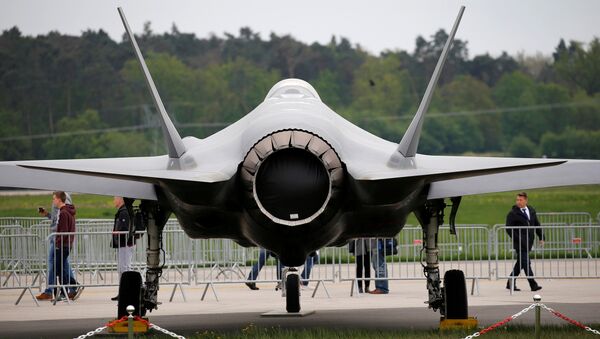Mr Hoyle told the Financial Times that Germany may not be able to operate at the same level as its NATO allies.
Berlin will now have to pick between the Airbus Eurofighter and Boeing's F/A-18 fighter jet. German officials said the defence ministry has to review additional information from Boeing and Airbus on their planes before it makes the final pick, as the aircraft has to be certified to carry US nuclear weapons.
Dr. Mark Gubrud, adjunct assistant professor in peace, war, and defence at the University of North Carolina, told Sputnik that there are many factors that may have led Germany to make this choice, "including European dislike of President Trump, desire to build European industries and be less dependent on the US for defence needs, and concerns about the cost and deficiencies of the F-35.
The F-35 is a high performance, 5th generation strike fighter which has been criticised due to unresolved design flaws and its cost. "It has been very controversial, hence there is not a lot of confidence that it is the best choice for many countries," the scholar said.
READ MORE: Pentagon Claims Turkey Won't Get F-35 If S-400 Deal Goes Through
Another reason why Berlin may have decided to drop the F35 is that Germany and France are working on the creation of a Franco-German advanced aviation combat system, FCAS, althrough Dr Gubrud noted that it's still not clear if this project will succeed:
"FCAS aims at a "6th generation" aircraft, i.e. a generation beyond F-35. Whether that effort will come to fruition or be eclipsed by other projects remains to be seen. I prefer to hope that we can end this insane arms race."
Professor Beatrice Heuser, Chair of International Relations at the University of Glasgow and a former consultant to the UK Ministry of Defence, the French Ministry of Defence and the European Commission, explained that first of all, Germany is a sovereign state and nobody can tell it what to do despite some experts saying that such policies will lead to a decline of NATO:
"All NATO members are sovereign states and in no way legally obliged to do what one member tells them to. So for an extreme case, France unilaterally decided, in 1965, to withdraw in the following year form the integrated military structure, and to kick other members' forces out of France. All the others complained, and France gave a damn. Many things like that have happened over time — e.g. some members won't allow nuclear weapons on their territory. Bottom line, nobody can force them to, not even the USA."
Apart from refusing to purchase Lockheed Martin's F-35 stealth combat aircraft, Germany has been criticised, especially by US President Donald Trump, for failing to comply with the NATO spending target of 2% of GDP on defence.
Mrs. Heuser believes that despite the US leader's harsh rhetoric against Berlin, there's only so much he can do:
"What Trump is capable of doing if Germany does not comply — well, there are many possibilities, from writing rude tweets about Angela Merkel to scuppering trade deals or closing down more military bases in Germany. The more ties you have between two countries, the more pain you can inflict (in fact usually on both sides, including your own industry or armed forces) by cutting those ties."
In his turn, Dr. Mark Gubrud noted that Berlin's choice won't really effect its relationship with the alliance as "NATO is not falling apart and Germany will not leave NATO."
However, talking about the future purchases of Lockheed Martin's F-35 Lightning II, the University of North Carolina adjunct assistant professor said that there are signs of problems:
"The F-35 programme will not collapse but the difficulties it is experiencing are a sign of crisis. The US is not weak and NATO is not falling apart but a surging arms race with Russia and China is not sustainable."
READ MORE: US Defence Giant Blasts Germany's Refusal to Buy F-35s as ‘Retrograde Step'
Germany isn't the only NATO member that has decided to drop the F-35 jet. Italy has also refused to purchase the fighter aircraft, the UK is considering the same option due to a lack of funds in the annual budget of the country's Ministry of Defence, and Turkey is also not afraid of being compelled to backtrack on its move to purchase F-35 fighters in the event that the US sanctions the country over its purchase of Russian S-400 defence systems.
Dr. Gubrud said that this shows that the world is changing and there's no more US "superiority".
"We are approaching a point where Russia, the US and China will have rough parity in advanced military technical capability. For the US, this will mean the end of our 'conventional superiority' — the idea that the US can always prevail short of nuclear war," he concluded.
*Views and opinions expressed in this article are those of experts and do not necessarily reflect those of Sputnik.



